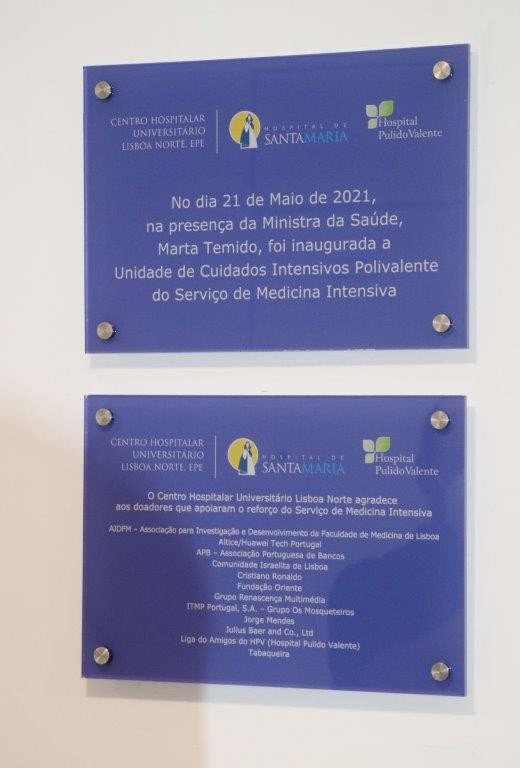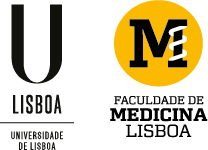
The Northern Lisbon University Hospital Centre (CHULN) inaugurated the largest Intensive Care Unit in the country. An event was organized to highlight the improvement of the Multipurpose Intensive Care Unit of Santa Maria Hospital. This unit had an investment of 3 million and 400 thousand euros (€ 1,600,000 in construction and € 1,800,000 in equipment). From 11 beds, it has increased to 44. The Hospital Centre now has 111 beds in Intensive Care alone.


The equipment financed by the Oriente Foundation, football player Cristiano Ronaldo, sports agent Jorge Mendes, and the Israeli community in Portugal, cost more than the work itself, which reveals the high commitment to technological quality.
The new unit also has negative pressure rooms, where patients with an infectious disease can be admitted. They allow the infection to be contained in them, without transmitting it to others outside. It also offers patients a wireless network and a TV to communicate/interact with the external environment, always protecting their privacy.


After the visit to the new Unit, the President of the Lisbon Academic Medical Centre and Director of the Faculty of Medicine of the University of Lisbon, Fausto Pinto, welcomed the delegation that visited the Hospital, as well as the members of the Board of Directors and Clinical Directors. Quoting Einstein, one of the key messages in his speech pointed to the need to work as the CAML, not financially unprotecting research and teaching to the detriment of the clinic. “We cannot expect different results when we always do the same”. Emphasizing the importance of strengthening ties between parties, Fausto Pinto, insisted on the urgency of reinforcing the status of University Hospital "so that true modern Medicine is practiced". And he added that for such actions to be conducted, “it takes capacity, courage and competence to continue to work together as an Academic Centre”.

Daniel Ferro, Chairman of the Board of Directors of CHULN, highlighted the success numbers of the new Unit, and stated that it is equally necessary to strengthen Intermediate Care. However, he said that "the pandemic also had positive aspects, as it generated possibilities like the one opened today".
A conference, attended by Graça Freitas, Director General of the General Directorate of Health, and by Fernando Medina, Mayor of Lisbon, closed the opening session. The Minister of Health, Marta Temido, gave an emotional testimonial and recalled the recent past, looking at the still fragile present, knowing that "much work remains to be done in the future", such as to provide the NHS with more means and investment. She said that she still feels great emotion every time she revisits all the moments she has experienced so far. "In my office, I have a board with some testimonials from Intensive care doctors and other health professionals, and I can't help but be moved when I reread their words about fragility, finitude and fear in the eyes of the sick".

She gave a medal to João Gouveia, Specialist Doctor in Internal Medicine/ICU at Garcia de Orta Hospital, EPE, and thanked, on behalf of the Ministry of Health, “all Intensivists in the country and all those who coordinate this national project”.
Living what she called a time of interregnum, because we have not yet left Covid behind, we have to persevere in the measures (...) I challenge the NHS not to lose the spirit it has conquered in the last 15 months".

The ceremony continued with three speakers, moderated by Marina Caldas.
João Gouveia, President of the Portuguese Society of Intensive Care Medicine and President of CARNMI, opened the conference talking about the current situation in Intensive Care Medicine in Portugal, addressing the theme of SARS-CoV-2 and affirming that this area of Medicine was the key to survival in combating Covid-19.

Then, António Pais Martins, Coordinator of the ICU of S. Francisco Xavier Hospital, spoke about the role of Intensive Care in assisting critical Covid patients. He acknowledged the resilience of all the professionals who were at the forefront in the fight against Covid-19. He reported that the pandemic could have been prevented, with the WHO taking too long to sound the alert, something that would have prevented the catastrophe classified as “21st century Chernobyl”. He also stressed the need for a new independent global surveillance system, based on “total transparency”.

Finally, João Miguel Ribeiro, Director of the Medical Service of CHULN, EPE, spoke about the requalification and the importance of Intensive Care Medicine at CHULN, EPE. The director acknowledged and thanked those who made this project possible and highlighted the effort of all doctors in this area of CHULN over more than 12 months of the pandemic.
He said that “with this requalification project, in my view the essential pillars that must characterize the medical services of this Hospital, like: assistance capacity; promotion of differentiation; expression of skills; training and promotion of training, research and innovation are clearly reinforced. This is our commitment and I assure you that it is also the commitment of all professionals in the intensive care service”.





